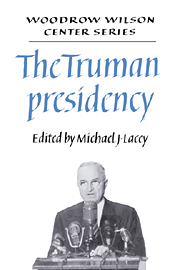Book contents
- Frontmatter
- Contents
- Acknowledgments
- Introduction and summary: The Truman era in retrospect
- 1 The mind and character of Harry S. Truman
- Part I Domestic politics and issues
- 2 Forging America's postwar order: domestic politics and political economy in the age of Truman
- 3 Attitudes toward industry in the Truman administration: the macroeconomic origins of microeconomic policy
- 4 Labor in the Truman era: origins of the “private welfare state”
- 5 Postwar American society: dissent and social reform
- 6 “Some sort of peace”: President Truman, the American people, and the atomic bomb
- Part II Foreign policy and national defense
- About the authors
- Index
6 - “Some sort of peace”: President Truman, the American people, and the atomic bomb
Published online by Cambridge University Press: 06 October 2009
- Frontmatter
- Contents
- Acknowledgments
- Introduction and summary: The Truman era in retrospect
- 1 The mind and character of Harry S. Truman
- Part I Domestic politics and issues
- 2 Forging America's postwar order: domestic politics and political economy in the age of Truman
- 3 Attitudes toward industry in the Truman administration: the macroeconomic origins of microeconomic policy
- 4 Labor in the Truman era: origins of the “private welfare state”
- 5 Postwar American society: dissent and social reform
- 6 “Some sort of peace”: President Truman, the American people, and the atomic bomb
- Part II Foreign policy and national defense
- About the authors
- Index
Summary
For millions of Americans born before World War II, memories of President Truman are inextricably interwoven with memories of the atomic bomb. To be sure, Franklin D. Roosevelt had launched the Manhattan Project, but that was all in secret. It was Truman who announced the staggering news to the world on 6 August 1945, who was central to the controversies of 1946–47 over both domestic and international control of atomic energy, who announced the first Russian atomic-bomb test in September 1949, and who in January 1950 authorized development of the hydrogen bomb.
For anyone interested in Harry Truman and his presidency, the question of the atomic bomb is clearly central. For the historian concerned with the bomb's effect on American thought and culture, Truman inevitably looms as a key figure. Curiously, however, neither Truman scholars nor historians studying the evolution of popular attitudes toward nuclear weapons have given Truman's comments about the atomic bomb the close attention that one might expect. We have excellent studies of Truman's role in the diplomacy, strategy, and domestic politics of the early postwar period as they related to the atomic bomb, but relatively little attention has been given to a systematic analysis of his views on the atomic bomb per se.
One reason for this is probably the elusive nature of the evidence. Truman had a good deal to say about the atomic bomb, as about most subjects, but much of it was ad hoc and fragmentary.
- Type
- Chapter
- Information
- The Truman Presidency , pp. 174 - 202Publisher: Cambridge University PressPrint publication year: 1989
- 2
- Cited by



